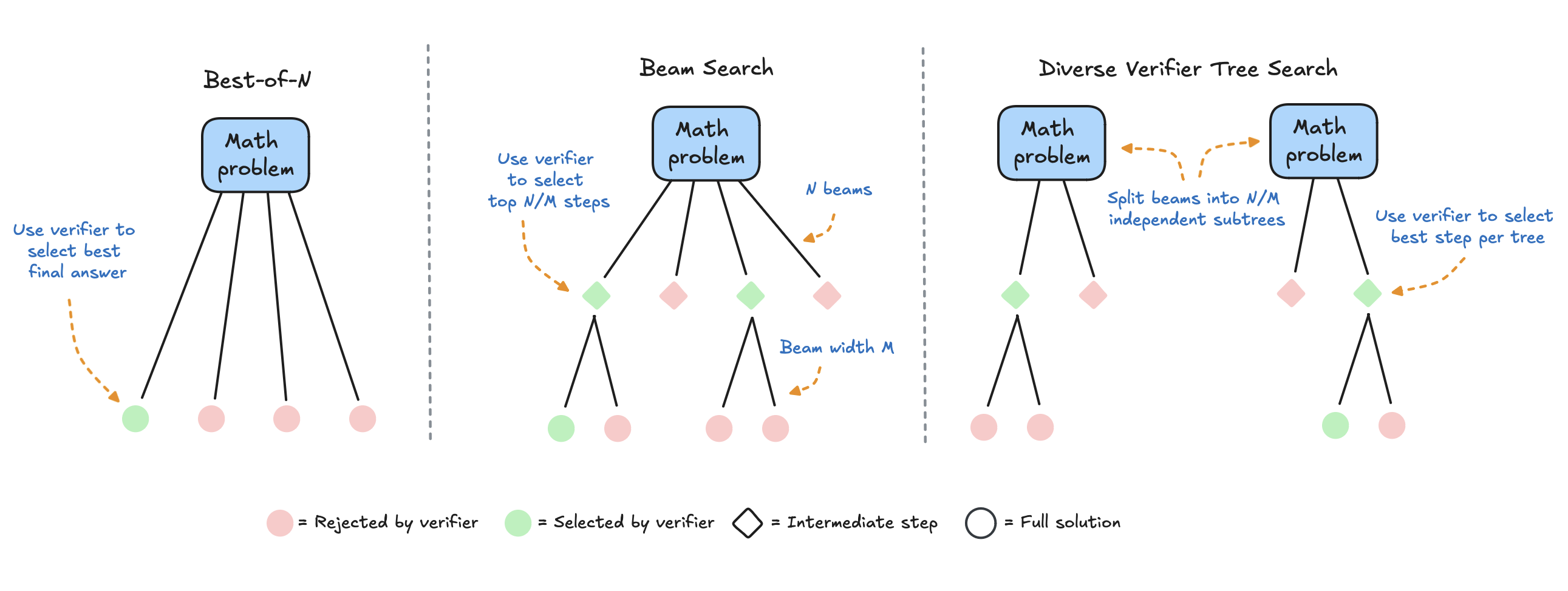AI Gets Smarter by Knowing When to Shut Up
6 minutes
Hey there!
Recent research from Johns Hopkins University explores a new way to make AI models more reliable by assessing their own confidence before responding. This selective answering mechanism helps models only reply when they're sufficiently certain, significantly reducing errors, especially in high-stakes situations.

Illustration of various test-time scaling search strategies used in test-time compute scaling from Hugging Face. This image illustrates three different search strategies used in AI models for solving problems like mathematical reasoning. Each method involves generating multiple possible solutions and using a verifier to select the best one.
This approach pairs well with an emerging AI inference strategy called test-time scaling. Unlike traditional models with fixed computational limits, test-time scaling allows AI to dynamically adjust its computing power based on the complexity of a task.
Several advanced AI systems already use test-time scaling, including OpenAI's o1 series, DeepSeek-R1, s1 models, and Llama-3.2 variants. The growing adoption of these techniques signals their importance in making AI smarter, safer, and more practical for real-world applications.
By combining selective answering with test-time scaling, AI models can reason more deeply while knowing when to stay silent, a major step forward in building AI systems that are both powerful and trustworthy.
Now, let's get to the news!
Generative AI Tools Updates
Inception Labs Introduces Mercury
Inception Labs has launched Mercury, a new AI text model that employs a diffusion-based approach, similar to the technology behind leading image generators like Midjourney and DALL-E. This represents a major shift in text generation, promising increased efficiency and performance.
Key Features
- Diffusion-Based Architecture: Uses a process traditionally applied in image generation to enhance text synthesis.
- High-Speed Processing: Operates up to 10 times faster than conventional AI text models.
- Innovative Hybrid Approach: Blends image-generation techniques with text modeling, pushing new boundaries in AI-generated content.
Microsoft’s Dragon Copilot
Microsoft has unveiled Dragon Copilot, the healthcare industry’s first unified voice AI assistant. It integrates Dragon Medical One’s voice dictation with DAX Copilot’s ambient listening, streamlining clinical workflows to reduce administrative burden and improve patient care.
Key Features
- Unified Voice Experience: Combines real-time dictation with AI-powered ambient listening.
- Automated Documentation: Generates clinical notes and manages tasks using customizable templates.
- Instant Information Retrieval: Enables quick access to trusted medical data.
- Task Automation: Simplifies orders, summaries, and referral processes.
- Security & Compliance: Designed with healthcare-specific safeguards and robust data protection measures.
Sesame AI’s Conversational Speech Model (CSM)
Sesame AI has introduced its Conversational Speech Model (CSM), which significantly improves AI-generated speech. Unlike traditional text-to-speech (TTS) models, CSM captures natural tone, rhythm, pauses, and emotional depth, creating more human-like speech.
Key Features
- Authentic Voice Presence: Captures intonation, pauses, and emotional cues for natural delivery.
- Multimodal Processing: Simultaneously processes text and audio for real-time adaptation.
- Advanced Tokenization: Uses Residual Vector Quantization (RVQ) to separate semantic and acoustic features for expressive speech.
- Context-Aware Prosody: Adjusts tone, pace, and rhythm dynamically based on conversation history.
- Efficient Training: Reduces memory overhead while maintaining high-fidelity speech generation.
Cortical Labs Launches the CL1: The First "Living Computer"
Cortical Labs has introduced CL1, the world’s first "living computer," which merges human neuron-cultivated cells with silicon-based technology. This innovation in Synthetic Biological Intelligence (SBI) aims to transform fields like drug discovery, personalized medicine, disease detection, and robotics.
Key Features
- Hybrid AI & Biology: Integrates living neurons with silicon computing for adaptive intelligence.
- Life-Support System: Features a built-in system for sustaining live neural cells.
- Programmable Stimulation: Includes a bi-directional stimulation interface and Python API for advanced research applications.
- Energy-Efficient Design: A rack of 30 CL1 units consumes only 850–1,000 watts.
- Global Availability: Available for advanced laboratories with a “Wetware-as-a-Service” model for remote access to cultivated neural cells.
Tencent Holdings Introduces Yuanbao
Tencent Holdings has launched Yuanbao, its new AI chatbot designed to compete with ChatGPT-like services. Built on Tencent’s in-house large language model, Hunyuan, Yuanbao provides advanced document analysis, question answering, and text/image generation capabilities.
Key Features
- Powered by Hunyuan: Uses Tencent’s trillion-parameter large language model, refined over the past year.
- Multifunctional AI Assistant: Handles document analysis, summarization, Q&A, and multimodal content generation.
- Ecosystem Integration: Seamlessly connects with Tencent’s platforms, including WeChat’s Official Accounts.
- Wide Availability: Now accessible in app stores across mainland China.
Other News
- Google SpeciesNet: Google has launched an AI model called SpeciesNet designed for wildlife identification.
- Meta AI Mind-Reading AI: Meta AI is developing AI that can decode thoughts into text via brain activity.
- Cohere Aya Vision: Cohere's Aya Vision AI model analyzes images in 23 languages with less computing power.
- Claude 3.7 Sonnet in ElevenLabs: Claude 3.7 Sonnet is now available in ElevenLabs Conversational AI.
- Microsoft Copilot UI Revamp: Microsoft has redesigned the user interface for Copilot.
- Google AI Mode in Search: Google is testing "AI Mode" in Search, allowing complex questions and follow-ups.
- OpenAI Simplified AI Agents: OpenAI just introduced a complete platform for building AI agents that perform real-world tasks instead of just chatting.
Curated Gems: 5 Chain-of-Thought-Inspired Prompting Techniques You've Probably Missed
We've just published a new set of docs in our Prompt Engineering Guide for 5 chain-of-thought-inspired prompting techniques you've probably missed:
- Chain-of-Code: combines code execution and language-based reasoning, merging the strengths of Chain-of-Thought (CoT) and Program of Thoughts (PoT).
- Chain-of-Density: enhances text summarization by iteratively refining summaries and integrating missing details while maintaining a fixed length.
- Chain-of-Dictionary: enhances multilingual machine translation by incorporating external dictionary entries into the prompt, helping LLMs translate rare or low-frequency words more accurately, especially in low-resource languages.
- Chain-of-Draft: optimizes LLM reasoning by generating concise, information-dense outputs while being a more efficient alternative to Chain-of-Thought (CoT) prompting.
- Chain-of-Knowledge: improves reasoning in LLMs by structuring knowledge representation and verification, reducing hallucinations common in Chain-of-Thought (CoT) prompting.
Check them out and let us know what you think!
From Learn Prompting Team: Our AI Security Masterclass Now Features 9 Top Experts

Time is running out. In just 3 days, we kick off our 6-week Masterclass on AI Security, where you'll learn from leading experts in Generative AI, Cybersecurity, and AI Red Teaming.
And there's more: we've added four new live guest speakers, bringing the total to nine AI security specialists who will share their cutting-edge insights and hands-on expertise with you.
Meet your instructors and guest speakers:
- Sander Schulhoff: CEO of Learn Prompting, creator of HackAPrompt, and leader of AI security workshops at Microsoft, OpenAI, Deloitte, Dropbox, and Stanford.
- Jason Haddix: Former CISO at Ubisoft, Head of Security at Bugcrowd, and a top-ranked bug bounty hacker, with extensive experience in penetration testing and AI security.
- Richard Lundeen: Principal Software Engineering Lead at Microsoft’s AI Red Team, developing PyRit, a foundational AI security framework.
- Sandy Dunn: Cybersecurity leader with over 20 years of experience, project lead for the OWASP Top 10 Risks for LLM Applications, and an adjunct professor in cybersecurity.
- Joseph Thacker: Principal AI Engineer at AppOmni, top AI security researcher, and winner of Google Bard's LLM bug bounty competition.
- Donato Capitella: Offensive security expert and AI researcher with over 300,000 YouTube learners, teaching how to build and break AI systems.
- Akshat Parikh: Elite bug bounty hacker, ranked in the top 21 in JP Morgan’s Bug Bounty Hall of Fame, and AI security researcher backed by OpenAI, Microsoft, and DeepMind researchers.
- Pliny the Prompter: Well-known AI jailbreaker, specializing in bypassing major AI model defenses.
- Johann Rehberger: Former Microsoft Azure Red Team leader, known for pioneering techniques like ASCII Smuggling and AI-powered C2 attacks.
Final spots are available. Sign up today!
Thanks for reading this week's newsletter!
If you enjoyed these insights about AI developments and would like to stay updated, you can subscribe below to get the latest news delivered straight to your inbox.
See you next week!
Valeriia Kuka
Valeriia Kuka, Head of Content at Learn Prompting, is passionate about making AI and ML accessible. Valeriia previously grew a 60K+ follower AI-focused social media account, earning reposts from Stanford NLP, Amazon Research, Hugging Face, and AI researchers. She has also worked with AI/ML newsletters and global communities with 100K+ members and authored clear and concise explainers and historical articles.
